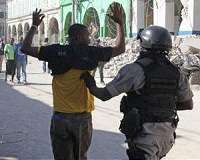| . |  |
. |
Saint Marc, Haiti (AFP) Jan 25, 2010 The Haitian town of Saint Marc is sinking beneath a tide of humanity, with 10,000 refugees lodging with friends, strangers or in churches after fleeing the nightmare of the quake-hit capital. Buses incessantly pass through the town some 80 kilometers (50 miles) north of Port-au-Prince, loaded with earthquake victims hoping to find food and shelter from the aftershocks of the January 12 disaster. "My house was destroyed. We slept on the pavement near the wounded, we had to leave," says Magalie Esteverle, a 43-year-old dressmaker with three children staying with a distant cousin of her husband. "I called my cousin and said I was ready to even sleep under a table. So we left with only the clothes on our backs." Haitian authorities announced plans last week to evacuate up to 500,000 people from squalid conditions in Port-au-Prince and put on dozens of free buses to what it promised would be more hygienic tented camps outside the city. But with thousands of others fleeing the capital on private buses, the mass exodus is putting a huge burden on places like Saint Marc, a town of 182,000 inhabitants which also hit by deadly floods in 2008. Feelings of solidarity run high here. Hundreds of people have found refuge in a hotel or on reed mats installed in churches and schools. Thousands more have been put up in the houses of relatives, friends and even strangers. They have been fed and clothed by anonymous donors who have spontaneously reached into their pockets, forgetting their own poverty and unemployment. Hundreds more have flooded into the Saint Nicolas hospital to seek treatment for injuries after being turned away by the capital's inundated hospitals. The government says nearly 200,000 people were wounded in the quake. "There was nowhere to stay in Port-au-Prince and nothing for us to live on," says Florence Dorfeuil, a 22-year-old student sitting at the bedside of her cousin, who is awaiting an operation on his leg. Majot powers are working to take the pressure off the stricken capital. French Ambassador Didier Lebret told AFP that France had evacuated some 1,400 refugees to the French territories of Martinique and Guadeloupe, and France itself. But Saint Marc is choking with the weight of refugees. The UN World Food Programme has distributed 12 tonnes of food but it is not enough. Familes who have accommodated up to seven people have received no extra aid and the anonymous donations are tailing off, says local civil protection administrator Constant Jean-Elie. "We have no means of feeding the refugees, we lack everything," he says. "Nothing has been given to help us accommodate these families -- we are obliged to rely on a local population of whom the majority does not work. It feels like we will collapse." Magalie Estervele's cousin, a jobless widow with four children, is doing all she can. "Sometimes we have, sometimes we don't, we share. But without help I won't be able to put them up for long," says Eva Jean, 43. At the hospital, dozens of the wounded lie on mattresses on the floor. Amputations and other operations are not happening quickly enough, and there are only three orthopaedic specialists and a cruel shortage of medical equipment, says hospital director Yfto Mayette. "We don't have enough to deal with all these cases," he says. The local authorities are coping for now, but they worry about tomorrow. "If the refugees stay, there will be big problems. A lack of food and the increase in joblessness could provoke violence and could overwhelm our existing structures," says local administrator Jean-Elie. The director of the hospital has similar fears for the town, which already houses refugees from a string of deadly storms almost two years ago. "All these people who have nothing and do nothing and whom one can't help will increase social problems here," Mayette says. In her cousin's tiny living room, Magalie Esteverle feels indebted. "I am trying to do whatever I can to make up for it," she says. "But I'm going to stay in Saint Marc. I'll never return to Port-au-Prince, it's a nightmare."
Related Links Bringing Order To A World Of Disasters A world of storm and tempest When the Earth Quakes
 Haitian police count their losses, prepare for calamity
Haitian police count their losses, prepare for calamityPort-Au-Prince (AFP) Jan 24, 2010 Police in the Haitian capital counted their loses and gathered their forces Sunday, preparing for a surge in crime they are certain will follow the devastating January 12 earthquake. Police leaders are still trying to determine how many officers can report for work and how many police stations are still operational. Looting is widespread in this city struggling to recover from the powerf ... read more |
|
| The content herein, unless otherwise known to be public domain, are Copyright 1995-2009 - SpaceDaily. AFP and UPI Wire Stories are copyright Agence France-Presse and United Press International. ESA Portal Reports are copyright European Space Agency. All NASA sourced material is public domain. Additional copyrights may apply in whole or part to other bona fide parties. Advertising does not imply endorsement,agreement or approval of any opinions, statements or information provided by SpaceDaily on any Web page published or hosted by SpaceDaily. Privacy Statement |